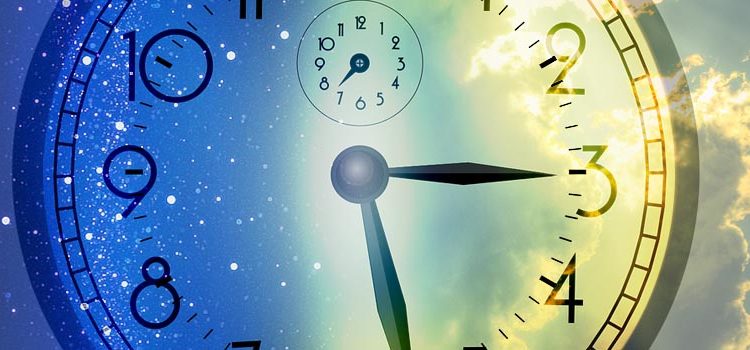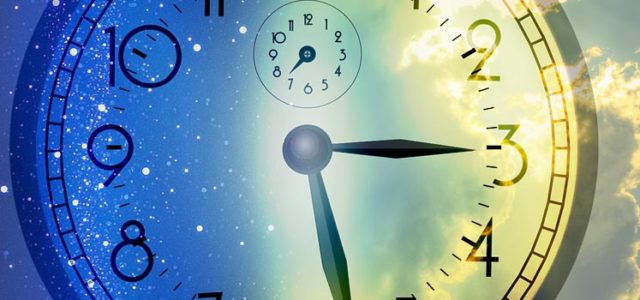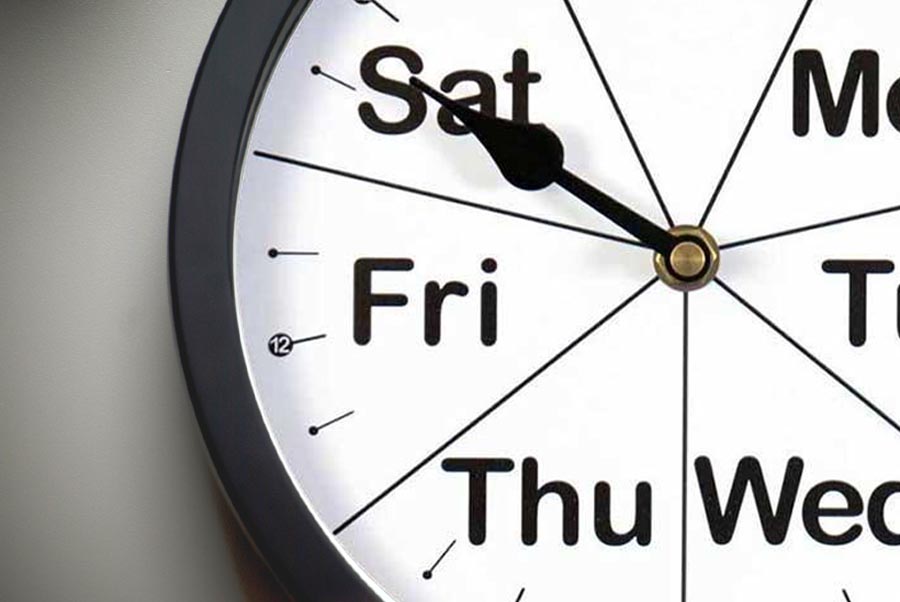


For the longest time, caregivers have had to improvise when it comes to helping their loved ones tell the time. This was mostly due to the absence of any dedicated devices that could aid people with dementia or Alzheimer’s to be aware of their environment.
All that is now in the past as there now exists a better understanding of these diseases that tend to severely affect the memory. As a result, a new kind of clock specially designed for dementia sufferers is making a splash in the dementia community.
Whether you are just hearing about these clocks for the first time or you want to know more, this guide offers you a thorough insight into these unique timepieces.
Popularly called dementia or Alzheimer’s clocks, these time-pieces display letters and/or numbers on a highly visible round face. Usually, visual reminders of date, day, and time are also included, and in some cases, spelled out in full. There are even models that feature large calendars or impressive digital displays and whose simple setup procedures are very elderly-friendly.
When these clocks are placed around a house or room of a dementia sufferer, they can clearly see the time, date, and on some models, reminders for themselves. Therefore, this reduces any confusion concerning the time of day and also eliminates their anxiety, for example, about missing an appointment or medication.
How to Tell If Your Loved One Needs a Dementia Clock

Presently, there are no official tests to detect dementia in a person. However, the following behavioral irregularities in your loved one can be used as a yardstick for diagnosing dementia.
If you notice any of the above signs in your loved one, a dementia clock could be useful to them.
The Benefits Of Getting A Dementia Clock

Some of the benefits of dementia clocks include:
1 Easing of confusion and panic
A major effect of dementia is the progressive decline in memory, problem-solving, language, attention, and judgment.
This decline typically manifests in the inability of an individual to keep track of current time or dates; a condition that may lead to panic and confusion.
However, with the aid of dementia clocks, your loved one will be able to differentiate the different parts of the day from each other and also tell the time.
2 Increasing independence
There are dementia clocks that allow you to input audio or video reminders. When these reminders go off at a time set by you, the dementia clock displays whatever message you need to pass at the time.
This means you don’t have to be physically present to provide reminders about meal times or the taking of medication. The individual can conveniently do this on their own and this helps make the dementia sufferer feel more independent.
3 Boosts self-confidence
Since your loved one does not have to be dependent on you for the most basic things, this gives their self-esteem a boost. It also makes them willing to learn how to do some easy tasks without your aid.
4 Provides a regular routine
People with dementia generally thrive on routines. A break in this structure can lead to an increase in anxiety and agitation.
But when a daily routine is in place and reminders are given for waking up, bathing, dressing, eating and taking medication, it helps with the establishment of a familiar pattern. Remember, when dementia sufferers know what to expect, they can look forward to doing it by themselves.
5 Puts you at ease
Dementia clocks do not only offer benefits to the individual with dementia; they are also good for caregivers.
With a dementia clock, you don’t have to be weary from always answering the same questions every day. It also eliminates your fear of your loved one getting lost or overwhelmed with simple tasks.
Best Selling Dementia Clocks
[amazon bestseller=”day clocks for people with dementia” description_items=”3″ description_length=”100″ button_text=”Buy Now” items=”3″]
The Different Types of Dementia Clock

There are several main types of dementia clocks available. Even though dementia clocks fulfill the same basic functions, they differ from each other in a variety of ways.
Understanding the various types of dementia clocks available to you and their features should be the first step before you purchase one.
1) Day Clocks
If one of your requirements for a dementia clock is utmost simplicity, then look no further than day clocks.
At first glance, they look like any typical analogue clock. But on closer inspection, you will see that day clocks are not for telling time. Instead, they only have the days of the week such as “Monday,” “Tuesday,” “Wednesday,” indicated on the display.
Day clocks are typically silent; there are no ticking, chimes or strange sounds to interrupt daily routines. These dementia clocks are AA battery powered and can be hung from a wall or slightly leaned on a mantelpiece.
2) Day/Night Clocks
The day/night clock shares a lot of similarities with the day clock. For one, it too looks like any regular clock that can be hung from a wall or rested on a platform. It is silent and AA battery operated. Furthermore, the display has high visibility that can be read without difficulty. However, that’s where the resemblance ends.
Unlike day clocks, the day/night clock has numbers on its display for telling the time. The hour and minute hand are crafted in such a way that they can be easily distinguished from each other.
Another difference is the background. While the day clocks have a plain background, day/night clocks typically have a changing background to suit the time of day.
For instance, when it is daytime, the clock’s background displays the sun in a blue sky. During night time, the background changes to a dark blue sky with moon and stars.
3) Digital Clocks
Digital dementia clocks are not like the above traditional analogue clocks. Instead, they resemble tablets or iPads.
These clocks show the current time, date, and day of the week. The LCD displays are also large and crystal clear so they can be clearly seen by people with poor eyesight.
Just like similar electronic devices, there are options to adjust the brightness and glare of the clock depending on what time of the day it is.
Digital clocks can be operated and accessed from virtually anywhere, just as long as you have internet connectivity. There are also options to connect to Skype and Facebook or online sites favored by your loved one.
Most digital clocks in the market are pre-programmed with about 5-8 different alarms that can be activated with a separate message. There are some that even have spaces on the display for photos. Digital clocks are usually powered by an ac adapter.
Features to Consider Before Buying a Dementia Clock
All dementia clocks are not created equal. They come in a variety of different shapes, sizes and with different features. With this in mind the top features we think you should consider when choosing a dementia clock include;
Display
![]()
Some people with dementia are not as easily able to form and retain new memories, but memories of their younger years are usually clear.
So if your loved one grew up around the time where analogue clocks were the norm, they could have a tough time understanding the display of a digital clock. However, a digital clock that spells out the time in easy-to-read fonts could be an option.
Power
![]()
Irrespective of your choice of clock, knowing how it is powered is one of the most important factors to consider. If you are tilting towards digital clocks, be aware that some require charging to remain operational.
If a situation arises where you are unable to charge this kind of clock ask your self if the individual using it charge it themselves? Whilst you could set a reminder on the clock itself for this task would they know how to charge the device?
If you are unsure, analogue clocks are always a safe bet. Their AA batteries can conveniently run for as long as 2 years without any interruption.
Operational noise
![]()
Dementia significantly worsens the way a person perceives an unfamiliar sound. The background sounds in an environment which may be unnoticeable to you can tend to be noisy or over-stimulating to dementia sufferers. And since hearing is linked to balance, noisy interruptions can also result in loss of balance, disorientation, and confusion. To prevent this, a silent clock or one with minimal sounds should be the ideal choice.
As you may have noticed, digital clocks tend to have alarms which could be quite intrusive. A great way to make this work for you is to choose a digital clock that allows you to play music as alarms. In addition, the musical choice should be favored by your loved one and played at a suitable volume.
How to Choose The Right Dementia Clock
Dementia occurs in two stages; the early stage and the mid to later stages. Selecting the right type of dementia clocks for your loved one should be dependent on the stage they are in.
Choosing the wrong kind of clock might not provide any benefit, or at worst, could increase confusion.
Early stages of dementia
If your loved one is exhibiting the onset of dementia, then they may still be able to read a clock. In that case, a digital clock or day/night clock will be most helpful to them.
Mid to later stages of dementia
At this stage, it might be difficult for your loved one to understand a clock display. And the continuation of the dementia clocks used in the early stages would only lead to disorientation Therefore, a day clock would be more suitable.
Frequently Asked Questions About Dementia Clocks
Should I buy a wall clock, a floor clock or a table clock?
This depends on your loved one. Are they more likely to notice a clock hanging on a wall or will it be best to keep a clock beside their favourite resting place? Your answer should guide you in making a choice.
Also, the size of the space where the clock will be placed plays an important part. For a large space, big analogue clocks at strategic places in the house can be helpful.
For small spaces, a digital clock with its many features usually works. However, an analogue clock should also be placed in the house for emergencies.
Which is the best type of dementia clock?
There are no best types of dementia clocks. Each of the clocks mentioned here serves a purpose and are good for different stages of dementia or memory loss.
By gauging the reactions of your loved one to the clocks, you can figure out which is best for them.
Can these clocks be used in combination?
Of course. If you’ve already got a digital clock, for instance, you should definitely keep an analogue clock somewhere in the house. They might definitely come in handy especially during times when the weather makes it difficult to distinguish between night and day.
Which type of clock should I get?
Your choice will largely depend on individual preferences.
If your loved one only needs gentle reminders, then a day/night clock or a digital clock would suffice.
If lots of reminders are required for things such as taking medication, watching favourite TV shows, meal times, or visits from family, then a digital clock is the most ideal.
The digital clock allows you to set multiple reminders and will help ensure not only the important but also the enjoyable daily activities are completed.
However, if your loved one constantly gets confused about what day it is, then the day clock would probably be the most suitable.
Last Words
Being a caregiver to a loved one with dementia can be heartbreaking and demanding. With a cure being far off in the future, one has to make do with the helpful devices that are on hand.
As you go shopping for a dementia clock, do keep in mind that people are different; and what works for one patient might not work for another.
Therefore, don’t get discouraged if nothing works at first. It could take several attempts to find the ideal clock that suits you and your loved one. You can recap the different kinds of dementia clock to determine their suitability here.
Best Selling Dementia Clocks
[amazon bestseller=”day clocks for people with dementia” description_items=”3″ description_length=”100″ button_text=”Buy Now” items=”3″]





